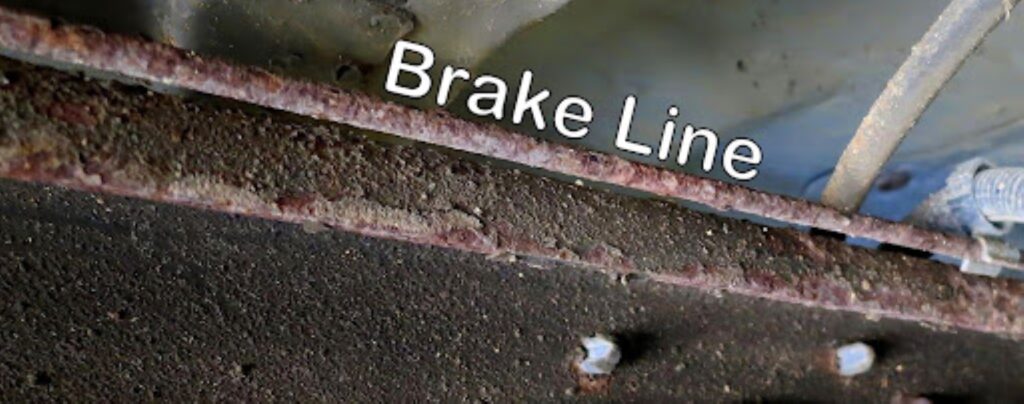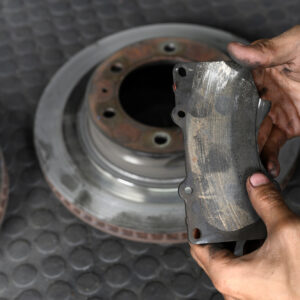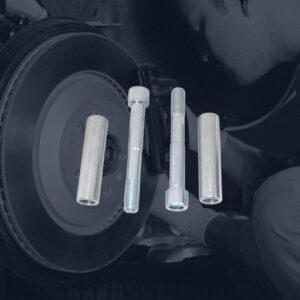Brake lag isn’t necessarily a bad thing. In fact, it’s a natural part of the braking process that’s used to calculate the stopping distance. However, too much brake lag is a different story. It’s often caused by serious issues in the brake system that can get worse the longer you ignore it.
What Is Brake Lag?
Brake lag refers to the time it takes for the brakes to engage after you step on the brake pedal.
But brake lag is more noticeable in air brake systems in larger vehicles. This is because it takes more time for air to travel through the brake system than it does for brake fluid in a hydraulic brake system. Brake lag in an air brake system can vary, but it’s usually around 4/10 of a second.
Note, however, that this article isn’t about air brake systems and large vehicles. We will be talking about your vehicle.
What Is Stopping Distance?
To compute a vehicle’s stopping distance, all you have to do is add the driver’s reaction time, brake lag, and braking distance.
Reaction time refers to the amount of time it takes for a driver to apply the brakes after realizing the need to stop the vehicle. On the other hand, braking distance refers to the distance traveled by the car after brake application until it comes to a complete stop.
Too much brake lag increases one’s stopping distance, which can make it hard to predict when to stop your car. Understanding this is key to safely stopping your vehicle on the road without bumping into another car or object.
Why Are My Brakes Not Stopping Fast Enough?
Here are common reasons why your braking power is low or less effective:
Fluid Leaks and Low Brake Fluid
Brake fluid is delivered under pressure of over 2,000 psi during panic stops and it travels through lines and high pressure hoses to the braking assemblies with a simple press on the brake pedal.
A leak in the system can lead to low brake fluid levels, which can prevent the brake system from building enough pressure. Likewise, dirty or contaminated brake fluid can cause the brake system to malfunction.

Faulty Disc Brake Caliper
Aside from brake lag, a stuck brake caliper can also cause your vehicle to pull to one side. A caliper that’s stuck in the applied position means the brake pads can only apply pressure to one side of the rotor, resulting in less braking efficiency.
Malfunctioning Brake Booster
If you have to press the brakes hard just to stop, then you might be dealing with a faulty brake booster. The brake booster helps you stop the vehicle with little to no effort by amplifying the torque from the brake pedal. When it fails or loses its vacuum supply (on vacuum boosters) or loses hydraulic assist pressure on a hydroboost system, the brake pedal can feel stiff, making it harder to stop your car.
Damaged Master Cylinder
When you press the brake pedal, the master cylinder converts this force into hydraulic pressure, which then activates the brake calipers and stops your vehicle. A damaged or leaking master cylinder can cause the pedal to feel spongy and the brakes to respond slowly.
More commonly, the master cylinder will cause the brake pedal to feel just fine initially and the car will stop, but as you sit at a traffic light or drive-thru holding the brake, you’ll feel the pedal falling away under your foot. When you release and reapply the pedal, it repeats the cycle: feels fine then falls away.
A damaged master cylinder will cause the brake pedal to feel just fine initially and the car will stop, but as you sit at a traffic light or drive-thru holding the brake, you’ll feel the pedal falling away under your foot. When you release and reapply the pedal, it repeats the cycle: feels fine then falls away.
– Richard McCuistian, ASE Certified Master Automobile Technician
Leaking Brake Lines
When brake lines are exposed to road salt and moisture, they can rust and crack. This can result in leaks and lead to insufficient brake fluid in the system. In the worst-case scenario, there won’t be enough brake pressure to stop the vehicle, resulting in complete brake failure.
If your brakes fail, however, there’s still a way you can stop your car safely. You have to pump your brakes to warn other drivers around you. Then, when you build enough brake pressure, you can slowly apply your parking brake (unless it’s an electric parking brake) until you can pull over.
Air in the Brake Lines
When air enters the brake lines, it’s always because the fluid in the master cylinder got too low because of a leak. Also, driving with the park brake engaged will cause the brake fluid to boil and make air where there was none before.
In this case, you’ll notice a significant drop in braking efficiency. These air pockets will compress when you press the pedal, slowing down the brake pressure as it reaches the calipers. This can cause the brakes to feel spongy and create excessive brake lag.
To fix this, you’ll need to bleed the brakes to remove all the air from the brake system.
Worn Brake Pads or Shoes Don’t Typically Cause Brake Lag
Because of the brilliant design of braking systems, both drum and disc brakes will stop the vehicle even if the lining is completely gone and the shoe or pad metal backing is all that’s making contact with the drum or rotor.
Deteriorated Brake Rotors Won’t Cause Brake Lag
You may feel pedal pulsation or hear grinding noises, but until the rotors are totally gone or the caliper pistons and wheel cylinders blow and lose their fluid, your brakes will still stop the car. Of course, once you hear grinding, you need to do something about it because you’re on borrowed time and when those cylinders or calipers blow the brakes fail very suddenly.
Is It Safe To Drive With Brake Lag?
No, excessive brake lag is a serious issue that needs your immediate attention. A delayed braking response makes your brakes unpredictable, which puts you at greater risk of getting into an accident. For your own safety, it’s best to bring your vehicle to an auto repair shop, so mechanics can fix the issue as soon as possible.
Any information provided on this Website is for informational purposes only and is not intended to replace consultation with a professional mechanic. The accuracy and timeliness of the information may change from the time of publication.































